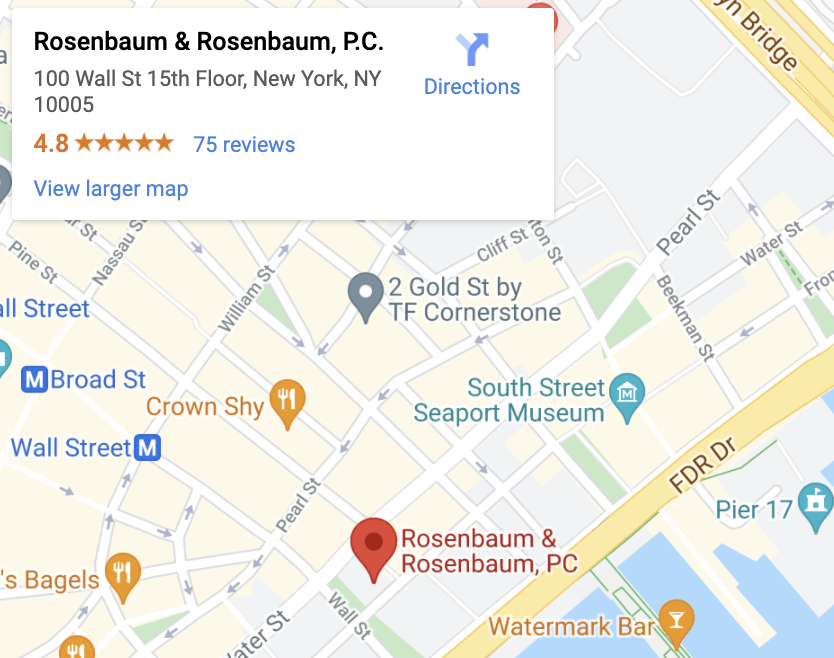Cow’s Milk-Based Formulas Linked to Necrotizing Enterocolitis (NEC) in Premature Babies

Premature infants are at a significantly higher risk of developing necrotizing enterocolitis (NEC) when they’re given a cow’s milk-based formula. Unfortunately, a baby with NEC may need surgery and suffer from a host of health problems, like sepsis. In some instances, NEC can be fatal in premature babies.
Has your child been injured, or have you suffered a devastating loss, after they developed necrotizing enterocolitis? Do you believe that their diagnosis and condition are related to the consumption of cow’s milk formula in the NICU? Contact an attorney to discuss your rights. You may have the ability to file a lawsuit and demand compensation for your child’s medical bills and your family’s suffering.
The experienced NYC NEC injury lawyers at Rosenbaum & Rosenbaum, P.C. can help you fight to maximize your financial recovery. Give our New York City law office a call to discuss your legal options today. There’s absolutely no charge for your initial case evaluation.
Table of Contents
Overview of Nutrition Options for Premature Infants

Premature babies have very strict nutritional needs. Breastmilk is the safest and most effective way to support a premature child’s growth and development. It contains all of the nutrients and enzymes that the child will need to thrive. It can also provide a whole host of long-term health benefits and advantages.
Breastmilk from the child’s mother is best, but donor breastmilk can be a great alternative.
In some situations, healthcare providers might suggest supplementing breastmilk with formula or using formula exclusively. Cow’s milk-based formulas are, by far, the most common. Enfamil and Similac are among the most popular brands.
Cow’s Milk Formulas and NEC
Just because formula is marketed, sold, and even suggested by doctors doesn’t mean it’s safe. Those designed with a cow’s milk base have been linked to necrotizing enterocolitis (NEC), a potentially deadly bacterial illness that primarily affects premature babies. Many major baby formula manufacturers have formulas designed specifically for premature infants.
This includes cow’s milk-based formulas like Enfamil and Similac.
Over the last decade, researchers discovered that premature infants who consume these cow’s milk-based formulas are statistically more likely to develop necrotizing enterocolitis (NEC) than babies who breastfeed exclusively. Several studies have reached the same conclusion. One study even found that extremely preterm infants have a 320% greater risk of developing NEC when fed cow’s milk formula.
Unfortunately, most parents are never informed about this and other serious risks associated with cow’s milk formulas. In turn, they lack the information they really need to make informed decisions about their newborn child’s health, wellbeing, and safety.
What is Necrotizing Enterocolitis?
Necrotizing enterocolitis is a serious medical condition that’s caused by a bacterial infection. NEC primarily affects – and is most dangerous to – premature infants, sick newborn babies, and significantly underweight newborns.
The condition causes the intestines to become inflamed, weaken and, in some cases, die. Often, the intestines become perforated, which allows stool to enter the abdomen and sets the stage for a serious and life-threatening infection.
NEC Can be a Deadly Condition
It’s well known in the medical community that NEC can be deadly – especially in premature or low-birth-weight infants. According to one study, NEC:
- Affects 5% to 12% of “very low weight” infants
- Requires surgical intervention 20% to 40% of the time, and
- Is fatal in 25% to 50% of infants diagnosed.
Studies compared NEC occurrence rates in pre-term infants exclusively fed human breast milk vs. cow’s milk-based formulas. They found that formula-fed premature babies are 6-10x more likely to develop NEC than breastmilk-fed babies.
In comparison, premature babies that received breastmilk more than 98% of the time showed only a 1.3% NEC occurrence rate. Babies fed donor milk had identical outcomes to those exclusively breastfed by their birth mothers. The implications are clear: Breastfeeding premature babies, or feeding premature babies human milk, exclusively is key for minimizing NEC risks.
What Are the Signs and Symptoms of NEC in Premature Babies?
NEC generally develops within the first few weeks of life.
The most common symptoms specific to NEC include:
- Hypotension (low blood pressure)
- Bradycardia (slow heart rate)
- Apnea (unnatural changes and pauses in breathing)
- Ileus (decreased bowel sounds)
- Abdominal distension (bloating or swelling in the abdomen)
- Tender abdomen
- Dark and bloody stools
- Constipation
- Vomiting and diarrhea
- Bloated or swollen abdomen
- Low body temperature
- Unstable body temperature
- Delayed gastric emptying
- General unexplained lethargy
In its advanced stages, signs of NEC include abdominal wall erythema (redness) and shock.
What Are the Long-Term Consequences of NEC?
In many cases, NEC leaves children with catastrophic, debilitating injuries.
Among those:
- Cerebral palsy
- Brain injuries
- Infant blindness
- Permanent blindness
Some children are forced to undergo bowel recision procedures to have some or all of their bowels removed.
Which Formulas Use Cow’s Milk as a Base?
80% of infant formulas sold have a cow’s milk base.
Some of the most popular brands include:
- Enfamil
- Similac
- Gerber
- Kendamil
- Earth’s Best
- Baby’s Only
- Bobbie
- Up&Up
- Lebenswert
- Go & Grow
- Happy Baby
- Parent’s Choice
Other formulas are developed using soy, goat’s milk, and other cow’s milk alternatives.
Who’s Liable If My Child Develops NEC From Drinking Baby Formula?
Under New York law, companies that design, manufacture, market, and sell products can be strictly liable of those products are harmful to consumers.
This includes Abbott Laboratories and Mead Johnson, the companies responsible for making Similac and Enfamil.
Why? There’s a whole host of research to support the fact that these cow’s milk-based formulas who’s a serious and heightened health risk to premature babies. However, the companies don’t warn consumers about these known risks. A failure to warn can be grounds for a product liability lawsuit if that undisclosed risk causes harm.
Schedule a Free Consultation to Discuss your Cow’s Milk-Based Formula Injury Lawsuit With a Product Liability Lawyer in NYC
The NEC injury attorneys of Rosenbaum & Rosenbaum, P.C. fight for families and infants who have been injured by cow’s milk-based formula. The NYC NEC injury lawyers at Rosenbaum & Rosenbaum, P.C. can help you navigate the process and work to maximize your financial recovery. If your baby has developed NEC after being fed cow’s milk-based formula and you would like to discuss your potential case, we encourage you to contact our NEC injury attorneys at (212) 514-5007.
We offer a free consultation, so don’t delay in reaching out to our law firm to schedule yours today.

